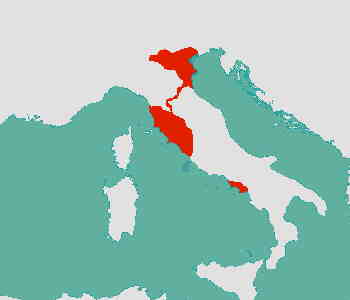
The Etruscan People and Their Language

The Etruscans are one of the few pre-Indo-European peoples to have survived to the Roman period and are probably one of the best known. They appear as a separate people,organized into city-states, at the very end of the eighth century,but probably go back even further. They emerged from an iron age culture generally called the Villanova Civilization and controlled present day Tuscany, Campania and a part of the Po valley. Divided into a dozen independent cities, they remained a major power in Italy up to the fifth century BC, retaining control of trade routes from the Mediterranean to Northern Europe. They also dominated Central Italia, ruling the then backwater tribes of Latium. They probably founded Rome as a strategic stronghold on a major trade route.
After the fifth century, however, the rise of Greek cities (especially Syracuse) in southern Italy and Gaulish invasions weakened Etruscan power. In 474, Hieron of Syracuse defeated the Etruscan at Cumae and took naval supremacy from them,which, combined with the expulsion of the Tarquin dynasty from Rome,cut off trade routes to Campania and allowed the Samnite tribes to overrun the Etruscan cities there.
After that Etruscan power began to decline seriously. The Gauls invaded the Etruscan colonies in the Po valley and sacked central Italy. Around the same time Rome, taking advantage of Etruscan political divisions and setbacks progressively conquered Tuscany, which was definitively conquered in 265 B.C with the fall of Volsinia. The Etruscan people, culture and language survived,however, under Roman rule, being progressively assimilated into the roman "melting pot". The language ceased to be written at the beginning of the Christian era but was probably spoken much later by peasants (influencing modern Tuscan dialects) and sorcerers, much in the same way as Sumerian.
Unlike most pre-Roman Italic languages, we have many inscriptions in Etruscan, mostly epitaphs but also some longer texts. The problem is that we understand them very imperfectly. The language, written in a variety of the Greek alphabet, is very different from other Italian tongues and is still quite obscure. We know only some 250 words and the most basic elements of grammar. We can understand most short writings but longer texts are beyond our understanding. Moreover, Etruscan seems to be an isolate. The only tongues that it is known to related to are the neighboring Rhaetic, of which we know almost nothing, and Lemnian, spoken on a small Aegean island, still very badly understood.
Many attempts have been made to decipher Etruscan or to link it to better known language families but, so far, none has given satisfying results. We can only say that Etruscan shows intriguing similarities to Indo-European languages, without belonging to that family.